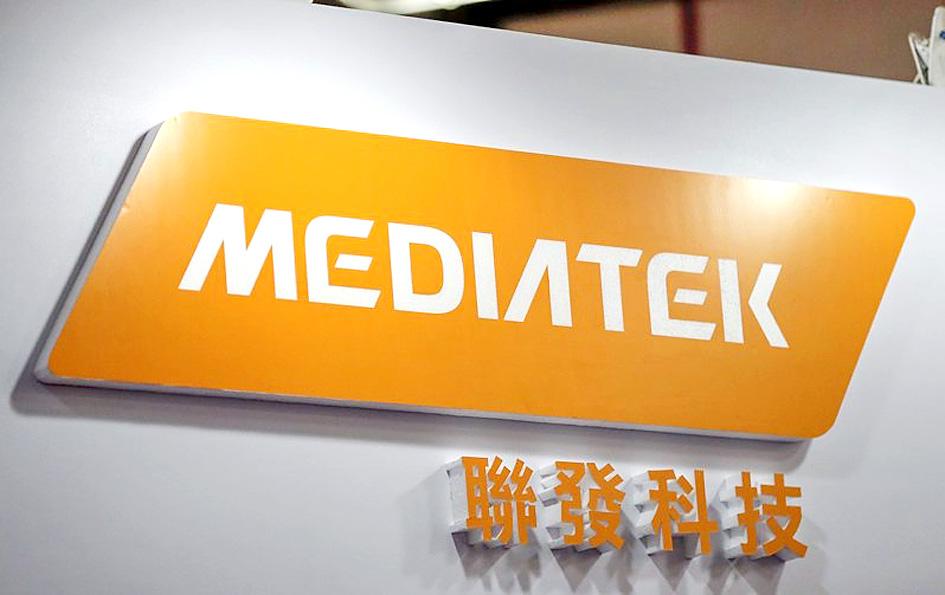MediaTek Inc (聯發科), the world’s biggest 5G chip supplier, saw its ranking rise by one notch to No. 7 last year among world semiconductor vendors, as it benefited from the rapid 5G smartphone uptake in China after Huawei Technologies Co (華為) was forced to exit the market, Gartner Inc said in a report yesterday.
MediaTek’s revenue soared 58.8 percent to US$17.45 billion last year from US$10.99 billion in 2020, outpacing the global semiconductor industry’s growth of 25 percent, according to Gartner’s tally. That gave MediaTek a 3 percent market share.
The Hsinchu-based chip company ranked No. 8 in 2020, behind Texas Instruments Inc.

Photo: EPA-EFE
“US sanctions on Huawei resulted in other Chinese smartphone original electronic manufacturers gaining share and fueling growth for 5G chipset vendors such as Qualcomm Inc, MediaTek and Skyworks Solutions Inc,” Gartner said.
HiSilicon Technologies Co (海思), Huawei’s chip designing subsidiary, saw its revenue decline from US$8.2 billion in 2020 to about US$1 billion last year, Gartner’s tallies showed.
Qualcomm ranked No. 5 last year, unchanged from the previous year. The San Diego, California-based company saw revenue jump 52.3 percent to US$26.86 billion last year from US$17.63 billion in 2020.
The 5G smartphone market was one of the major factors driving the world semiconductor industry’s revenue last year to US$583.5 billion, with production more than doubling to 555 million units last year from 250 million units in 2020, Gartner said.
“As the global economy bounced back in 2021, shortages appeared throughout the semiconductor supply chain, particularly in the automotive industry,” Gartner research vice president Andrew Norwood said.
“The resulting combination of strong demand, as well as logistics and raw material price increases, drove semiconductors’ average selling price higher, contributing to overall revenue growth in 2021,” he said.
Samsung Electronics Co grabbed the top spot for the first time since 2018, with revenue increasing 31.6 percent to US$75.95 billion last year.
Samsung’s memorychip revenue expanded 34.2 percent last year, in line with the growth rate of the overall memorychip market, Gartner said.
Intel Corp dropped to No. 2, with 0.5 percent growth in revenue last year to US$73.1 billion, delivering the lowest growth rate among the world’s top 25 semiconductor vendors.
Memorychip maker SK Hynix Inc came in next with revenue of US$36.33 billion last year, up 40.5 percent from a year ago.

Taiwan Semiconductor Manufacturing Co (TSMC, 台積電) last week recorded an increase in the number of shareholders to the highest in almost eight months, despite its share price falling 3.38 percent from the previous week, Taiwan Stock Exchange data released on Saturday showed. As of Friday, TSMC had 1.88 million shareholders, the most since the week of April 25 and an increase of 31,870 from the previous week, the data showed. The number of shareholders jumped despite a drop of NT$50 (US$1.59), or 3.38 percent, in TSMC’s share price from a week earlier to NT$1,430, as investors took profits from their earlier gains

In a high-security Shenzhen laboratory, Chinese scientists have built what Washington has spent years trying to prevent: a prototype of a machine capable of producing the cutting-edge semiconductor chips that power artificial intelligence (AI), smartphones and weapons central to Western military dominance, Reuters has learned. Completed early this year and undergoing testing, the prototype fills nearly an entire factory floor. It was built by a team of former engineers from Dutch semiconductor giant ASML who reverse-engineered the company’s extreme ultraviolet lithography (EUV) machines, according to two people with knowledge of the project. EUV machines sit at the heart of a technological Cold

AI TALENT: No financial details were released about the deal, in which top Groq executives, including its CEO, would join Nvidia to help advance the technology Nvidia Corp has agreed to a licensing deal with artificial intelligence (AI) start-up Groq, furthering its investments in companies connected to the AI boom and gaining the right to add a new type of technology to its products. The world’s largest publicly traded company has paid for the right to use Groq’s technology and is to integrate its chip design into future products. Some of the start-up’s executives are leaving to join Nvidia to help with that effort, the companies said. Groq would continue as an independent company with a new chief executive, it said on Wednesday in a post on its Web

CHINA RIVAL: The chips are positioned to compete with Nvidia’s Hopper and Blackwell products and would enable clusters connecting more than 100,000 chips Moore Threads Technology Co (摩爾線程) introduced a new generation of chips aimed at reducing artificial intelligence (AI) developers’ dependence on Nvidia Corp’s hardware, just weeks after pulling off one of the most successful Chinese initial public offerings (IPOs) in years. “These products will significantly enhance world-class computing speed and capabilities that all developers aspire to,” Moore Threads CEO Zhang Jianzhong (張建中), a former Nvidia executive, said on Saturday at a company event in Beijing. “We hope they can meet the needs of more developers in China so that you no longer need to wait for advanced foreign products.” Chinese chipmakers are in